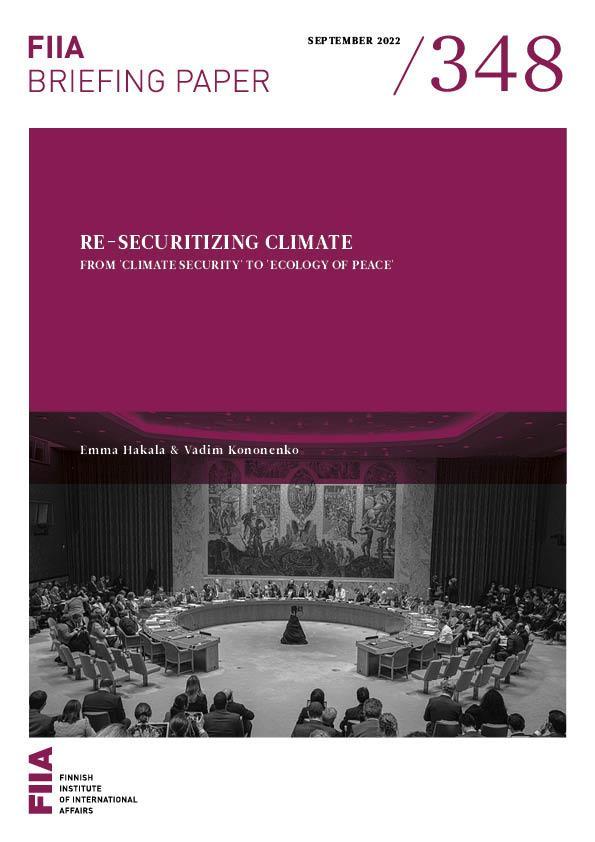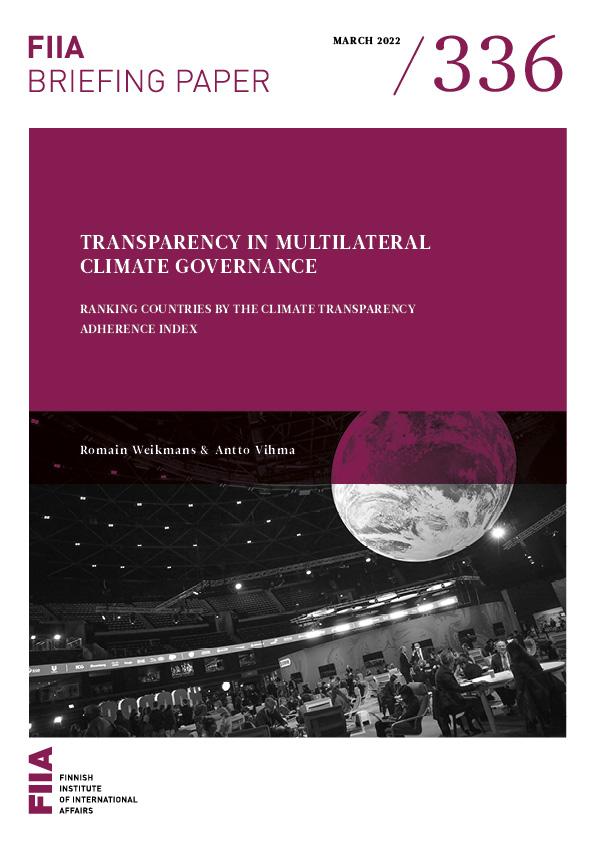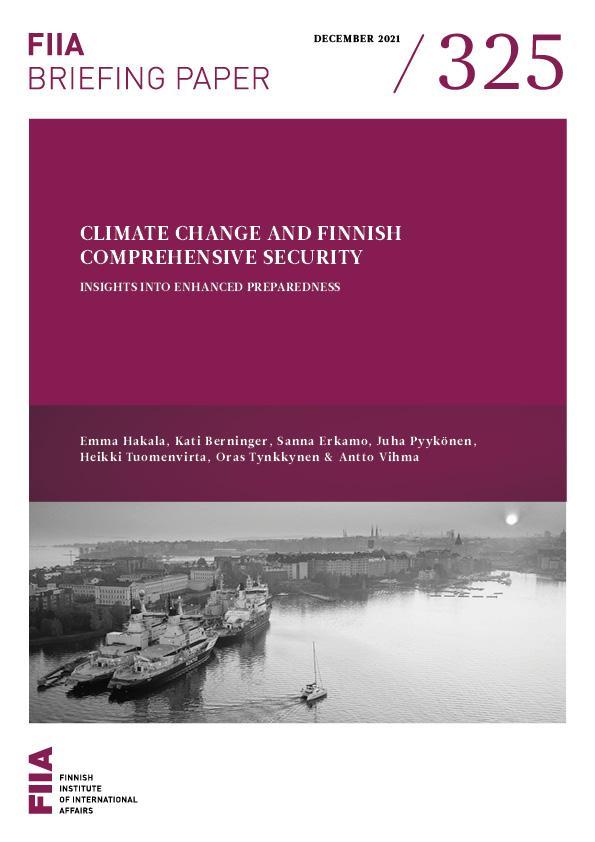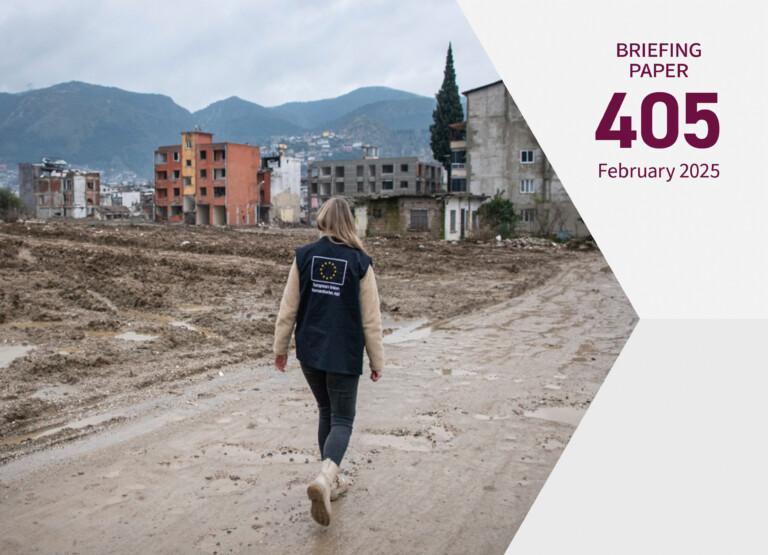
Yksi Ukrainan sodan seurauksista on se, että yhteisiä ratkaisuja ilmastoturvallisuuden edistämiseksi on yhä vaikeampi löytää.
Viime vuosikymmeninä toiveet yhteistyöstä ilmastoturvallisuudessa ovat keskittyneet ilmastomuutoksen ”turvallistamiseen” eli sen esittämiseen turvallisuuspoliittisena kysymyksenä. Oletuksena oli, että ilmastonmuutoksen turvallisuusvaikutukset nähtäisiin yhteisenä uhkana, jota käsiteltäisiin monenkeskisen yhteistyön kautta YK:n johdolla.
Ilmastonmuutoksen turvallistaminen osui samaan ajankohtaan, jolloin liberalismi ja monenkeskisyys alkoivat heikentyä kansainvälisessä politiikassa. Eripuraisten ja hajottavien suuntausten voimistuminen kansainvälisissä suhteissa voi johtaa siihen, että ilmastonmuutoksen turvallistaminen entisestään saattaa osoittautua vaaralliseksi ja lisätä erimielisyyksiä.
Ilmastoturvallisuus on osa suurvaltapolitiikkaa. Tämän tunnustaminen edellyttää sitä, että yhteistyön toteuttamista pohditaan perusteellisesti uudelleen, mikäli ilmastonmuutosta ei onnistuta pitämään erillään geopoliittisista umpikujista. Ilmasto- ja ympäristökysymykset olisi ”uudelleen turvallistettava” esimerkiksi ottamalla ne osaksi muutamiin olemassa oleviin monenvälisiin järjestelmiin, kuten Pariisin ilmastosopimukseen ja YK:n biodiversiteettisopimukseen.
Introduction
Global climate and environmental change is commonly referred to as a threat multiplier. It reduces security and increases material and intangible costs for individuals and communities. For states, a heightened sense of insecurity may increase geopolitical tensions over limited resources, which may lead to conflict. Since the early 1990s, encouraged by the successes of multilateral cooperation and a proliferation of new fora in the post-Cold War international environment, hopes have been high that countries would find collective ways to deal with the security implications of climate change.
In expert and policy communities, climate and environmental security has been approached mainly through a post-Cold War liberal lens of international cooperation, in the same way as other new security threats like pandemics and transnational terrorism. The threats have been framed as shared and harmful to all states, and therefore considered to have the potential for mutually beneficial agreements. This lens has given rise to the broad climate security agenda promoted by Western actors such as the European Union (EU) and the United States. The assumption has been that as climate change accelerates, it will be ‘securitized’, or integrated into the security agenda, by the same actors that have been shaping the liberal international security order. Cooperative arrangements and shared liberal understandings of climate security would emerge within wider security regimes like the North Atlantic Treaty Organization (NATO) or regional multilateral regimes such as the Organization for Security and Co-operation in Europe (OSCE).
Yet the relative hegemony of Western liberalism after the Cold War has given space to a hastened and increasingly militarized geopolitical competition. The Russian attack on Ukraine and the China-Taiwan tensions are only the latest examples that have paralyzed cooperation between several key countries that would otherwise need to be cooperating on climate security. In this context, climate security has become overshadowed by zero-sum game geopolitics and an active contestation of the liberal democratic security order by several powerful actors.
These developments shed new light on the idea of ‘climate security’. In the current international disorder, climate security can be regarded as an area of little or no cooperation and with low potential to prevent an actual conflict that can be caused by climate and environmental factors. Yet it can also be seen as an area where conflict is actively caused and stoked by states using climate and environmental change as a pretext. Either view means loss of life and unabated climate change and environmental degradation. The latest Intergovernmental Panel on Climate Change (IPCC) report is a strong reminder of the scope of conflict potential linked to climate change, indicating that approximately 3.3 to 3.6 billion people live in contexts that are highly vulnerable to climate change.[1]
Amidst the geopolitical storms and the increasing vulnerability of humankind to climate change, a serious rethink of climate and environmental security is therefore warranted. The war in Ukraine does not cancel any of the climate- and environment-related aspects of security. There is an urgent need for all countries to adapt to climate change and environmental degradation, and to shift to a climate-resilient model of development.
This Briefing Paper will consider what kind of climate security can and should emerge, in both conceptual and practical terms, in the emerging geopolitical situation. It will look at the underlying differences in the ways in which climate security has usually been conceptualized, and how this has hindered it from generating a shared understanding of its implementation. The paper will suggest ways to ‘re-securitize’ climate and environmental change and, finally, propose a post-liberal conceptualization of climate security based on an ecology of peace approach.
Securitization without cooperation
The ways in which cooperation is constrained on climate security are perhaps most discernible at the UN Security Council (UNSC). Climate change has been discussed by the UNSC repeatedly on the initiative of several countries, including the UK, Germany, and Sweden. However, an actual UNSC climate security resolution has yet to be adopted due to consistent opposition and vetoing by Russia and China. The two permanent members have remained firm in their view that climate change is not a matter of international security and therefore should not be included in the UNSC mandate.
The reluctance of Russia and China suggests that they adhere to conservative conceptions of climate security. For them, the inclusion of climate issues in the UNSC would only widen the range of shared, multilateral international security questions that could interfere with their own national interests. This does not mean that Russia and China fully exclude climate change from their own security considerations, but both primarily see it in terms of antagonistic rivalry and national security threats. In China, the increasing recognition of climate change as a part of transboundary water security relations with India has led the country to prioritize national security at the risk of rising tensions.[2] Meanwhile, Russia has included climate change in its National Security Strategy, but in addition to the direct threat of wildfires and other national disasters, it cites the potential risk of foreign powers using climate policy as leverage to exert political and economic pressure on Russia.[3]
On the other hand, countries that have actively promoted the climate engagement of the UNSC have usually linked the issue to peacebuilding and conflict prevention, calling for better understanding of and attention to the environmental pressures driving conflict and insecurity. Although the most active climate security countries are usually from the Global North, they have increasingly received support from countries in the South. The latest UNSC climate debate in December 2021, for instance, was put forward jointly by Ireland and Niger. Despite some optimism in the climate security community that a resolution would finally be passed, it was once again vetoed by Russia while China abstained.
In this regard, the gridlock in the UNSC over climate security can be seen as expressions of a diplomatic standoff between two visions of international order and security where cooperation on climate change is kept waiting in vain. One can describe this as a standoff between the Western liberal democratic order with human security at its core, and an illiberal statist vision with national interests in the form of control over territory and confrontational zero-sum strategic calculations.
The dichotomy may not be quite as clearly articulated in all of the ways in which international politics play out, but it has become the defining lens in the context of climate security in the UNSC, and other multilateral fora. As a result, there is little hope of any progress in joint support from all UNSC members to spearhead UN climate security action. Such action is badly needed on many levels from financing to providing UN operations with adequate skills and information on climate security implications. Similar considerations would apply to other organizations where cooperation on climate has stalled due to a geopolitical standoff with Russia, for example in the OSCE, or the Arctic Council. On the other hand, multilateral fora where countries are less divided, such as the G7, do not demonstrate significant progress on climate security either. Hence, the struggle between liberalism and authoritarianism – often highlighted as the defining ideological lens – does not help to capture the diversity of images of climate security, nor explain the lack of cooperation
Versions of climate security
Based on Richmond,[4] it is possible to discern at least four variations of climate security: the hyper-conservative, conservative, moderate, and emancipatory understandings. The differences lie, among other things, in the extent to which climate is securitized, reaching from the state level to the level of individuals, and in their understanding of security as either ‘negative’, based on security from the threat of others, or ‘positive’, in which case security can be more inclusive and empowering towards actors that are particularly vulnerable to security risks.
Regarding climate security, hyper-conservative narratives hark back to conceptions of international order before the liberal moment of the 1990s. Peace is seen as an outcome of deterrence and balance of power. Even though climate change is a physical reality, a tangible and accelerating threat to states, communities and individuals, it is primarily perceived from the point of view of its implications for national security. This coincides with the ways in which climate change has been integrated into the strategic thinking of actors contesting liberalism, such as Russia and China, but also coincides with the ways in which other, not necessarily anti-liberal actors securitized climate. For example, Israel has recently declared climate part of its ‘national security’, and its cooperation with Palestine on the closely related issue of water security has been low precisely because it is set within the context of the longstanding regional conflict.[5]
The conservative approach is also primarily concerned with national security, but sees peace as an outcome of the dependency of weaker actors on the more powerful one, for example in military or economic terms. This perception corresponds to the ways in which the Pentagon and the United States military, for example, have viewed climate change, recognizing it as a risk multiplier but considering its implications strictly from the point of view of national security.[6] Similar characteristics can be seen in NATO’s recently published Climate Change and Security Action Plan.
The moderate perception of climate security relies on elements of a liberal approach to security such as democratization, the rule of law, human rights, economic globalization and interconnectedness as economic and institutional preconditions for security. Such an approach can be seen in the way that climate security is presented in the EU’s Global Strategy.
Finally, the emancipatory model is concerned with needs as well as rights and a much closer relationship between people as custodians of their local environment. Emancipation is understood as a bottom-up process of empowerment with a strong concern for social welfare and justice. It equates to civil peace and is generally not state-led but shaped by civil society organizations. While no existing approach to climate security fully coincides with the emancipatory formulation, it can be argued that its elements are present, for example, in some of the objectives of the UN Climate Security Mechanism, established in 2018 as a joint initiative between several UN agencies. Similar aims are present in the regionally-focused work done by the OSCE in the Western Balkans and Central Asia, which can also be seen to have fed into an OSCE Ministerial Council Decision on strengthening cooperation to address the challenges caused by climate change, adopted in 2021.
Seen from this perspective, the securitization of climate does not sit neatly along the straightforward liberal/anti-liberal divide, but it has indeed evolved in parallel with the general development of international order. The process is not linear, but rather open-ended and with many long-standing unresolved security dilemmas.
A more detailed look at how climate security is understood by different international actors offers a glimpse of understanding that different versions of climate security exist even in the liberal camp. The EU is a case in point. As a study by Carnegie Endowment shows, there are numerous shortcomings and limitations in the EU’s climate security policies.[7] The EU’s climate policy is considered to be reactive or not strategic, and more importantly caught in between the emancipatory ecological approach and moderate-orthodox approach centred around the EU’s autonomy and ability to protect itself from climate-related risks.
Another observation worth making is the trend of polarization or a growing divide between the emancipatory and hyper-conservative (pre-liberal and post-liberal) understanding of security that may co-exist not only between states but also within a state, with a hyper-conservative government and civil society demanding a more emancipatory approach.

Towards an ecology of peace?
In part as a response to the lack of effective cooperation but also as further exploration of the emancipatory understanding of security, a new agenda appears to be emerging, primarily within the expert community but also picked up by actors located in the moderate-orthodox and emancipatory corner. This agenda, best described as an ‘ecology of peace’, is based on the notion that in order to address the varied and complex security implications of climate change, the concept of security needs to be seen beyond national security frames, linking it to everyday security, human dignity and the ability to lead a good life. Cooperation on climate security is seen as part of a bigger effort to contribute to environmental, social and economic sustainability.[8] However, it is crucial that this approach increasingly extends beyond narratives to generate practical solutions.
Currently, there are few actors able to implement the kind of post-liberal framings of climate security described above. At the global level, there is no overarching understanding as to what kinds of practices constitute climate security. While the UN’s Climate Security Mechanism has a global reach and has been able to set norms for a climate-resilient security, the focus has been quite exclusively on conflict and its prevention. With a UNSC resolution still missing, the Mechanism can be considered to lack a commonly agreed mandate for its work. The climate security activity in the OSCE is relatively nascent, and at higher political levels the work of the organization is plagued by internal divisions. Meanwhile, in the wake of the failed UNSC resolution in December 2021, the African Union (AU) showed its commitment to the issue by releasing a communiqué that called for consideration of the climate-security-development nexus for Africa. However, the AU’s policy responses on climate security have so far been limited by a lack of resources and leadership.[9]
The failure of the UNSC to effect action on climate security casts doubt over the kind of securitization where climate change has been taken out of the context of ecological crisis and inserted into the sphere of security. While this does not render the UNSC process meaningless, it suggests that there may be a need for reconsideration, or at least parallel effort, by returning it to the context of climate politics. In particular, climate security could be more deeply integrated into the United Nations Framework Convention on Climate Change (UNFCCC) process and the annual Conference of Parties (COP) meetings, where the states come together to present and discuss their commitments to cut emissions.
Until now, the focus of climate security has been on integrating security actors into climate change. However, in order to make climate security more inclusive, civil and local – that is, post-liberal – it needs to better integrate the climate community and broader civil society. For some time now, the COP agenda has already been considering questions of climate adaptation, which are close to the kind of foresight and preparedness actions needed in the development of climate security policies.[10] In addition, it is necessary for countries to take security considerations into account in their Nationally Determined Contributions (NDCs), that is, the action plans that each country prepares regarding their measures to cut emissions and adapt to climate impacts.[11] This, however, requires a deeper and more conceptual integration of climate security into the COP discussions. So far, security questions have appeared more prominently on the agenda only at COP26 in Glasgow in 2021.
At the same time, COPs provide several opportunities for advancing post-liberal climate security policy. It is a forward-moving, evolving process, and although progress on cutting emissions has been slow, successes such as the Paris Agreement in 2015 show that it has the potential to achieve action. As agreed in the Paris Agreement, the process is based on NDCs, or publicly presented pledges from countries regarding their plans on climate mitigation up to 2030. As the countries themselves have ownership of setting their goals and the ways in which they plan to achieve them, they are committed to and included in the work in a far more concrete way than in the UNSC debates, for example. In addition, the COP process enables more openness and inclusivity across the North-South divide and towards civil society. Although COPs have been rightfully criticized for retaining colonial tendencies and excluding voices of groups such as youth activists and Indigenous peoples,[12] the fact that these concerns are being discussed exerts additional pressure on states to address the groups’ concerns.
Steps forward
Any attempt to ‘re-securitize’ climate and environment, namely to decouple the issue from the geopolitical gridlock while sustaining cooperation, would require incremental steps. With the currently divided UNSC unable to adopt a resolution on climate security, one should not expect a diplomatic breakthrough in this instance. Yet progressive work can be done towards embedding climate security-related provisions into other frameworks such as the Paris Agreement on climate and the Convention on Biodiversity. In these frameworks, states can be encouraged to bring together their national data on climate security. Furthermore, the UNFCCC could create a special body within its secretariat to look into climate security issues specifically, albeit without significant powers to react to them. The UN IPCC report as the most authoritative source of knowledge on climate risks could include a more integrated assessment of the security implications of climate and environmental change.
Despite these potential steps, it is likely that the policy debate on climate security will unfold as part of a vicious circle where the worsening state of the climate and the natural environment reinforces geopolitical and geoeconomic competition between states. Striving for autonomy and self-reliance in the face of uncertainty and competition is a catch-all idea that seems to have captured security. It is all the more important for liberal and human-centred discourses on climate security to continue to exist, propelled by civil society and Western liberal democracies regardless of a nationalist and conservative backlash at home or internationally. It is crucial that Western actors, particularly the EU, continue to search for alliances and sustain cooperative networks on various aspects of climate security, be they trade, technological cooperation, scientific cooperation or investment in climate adaptation and mitigation.
The war in Ukraine has accelerated the shift from a liberal to a conservative notion of climate security, but the evolution was already underway. This seems to feed into the kind of perpetual state of emergency that may follow from the blurring of lines between the realms of normal and exceptional politics, as observed in the introduction to this Briefing Paper. However, securitization as emergency may also prompt change. As climate catastrophes multiply and extend into their territory, even climate-security sceptics like China, India and Russia might feel under pressure to support collective responses in the UNSC. This may be framed as developing their national resilience and will be linked to their domestic interests and needs. Therefore, the focus should be on recognizing moments of possible repositioning, and using it to expand the understanding of climate security – in other words to ‘re-securitize’ by bringing these understandings closer to the vision of an ecology of peace.
Endnotes
[1] IPCC (2021) Climate Change 2021: The Physical Science Basis. Contribution of Working Group I to the Sixth Assessment Report of the Intergovernmental Panel on Climate Change. Cambridge University Press, https://www.ipcc.ch/report/sixth-as-sessment-report-working-group-i/.
[2] Sahu, A. K., & Mohan, S. (2022) “From securitization to security complex: climate change, water security and the India-China relations”. International Politics 59(2): 320-345.
[3] Staalesen, A. (2021) “Climate change finds a place in Russia's new National Security Strategy”. The Barents Observer 6.7.2021, https://thebarentsobserver.com/en/security/2021/07/climate-change-finds-place-russias-new-national-security-strategy.
[4] Richmond, O. P. (2006) “The problem of peace: understanding the ‘liberal peace’”. Conflict, security & development 6(3): 291-314.
[5] Feitelson, E., Tamimi, A. & Rosenthal, G. (2012) “Climate change and security in the Israeli-Palestinian context”. Journal of Peace Research 49: 241-257.
[6] Burnett, M., & Mach, K. J. (2021) “A ‘precariously unprepared’ Pentagon? Climate security beliefs and decision-making in the US military”. Global Environmental Change, 70.
[7] Lazard, O., & Youngs, R. (2021) “The EU and climate security: toward ecological diplomacy”. Carnegie Europe, https://carnegieeurope.eu/2021/07/12/eu-and-climate-security-toward-ecological-diplomacy-pub-84873.
[8] Black, R. et al. (2022) Environment of Peace: Security in a New Era of Risk. Stockholm: SIPRI, https://doi.org/10.55163/LCLS7037.
[9] Aminga, V. M., & Krampe, F. (2020) “Climate-related security risks and the African Union”. Stockholm International Peace Research Institute.
[10] Hakala, E., Berninger, K., Erkamo, S., Pyykönen, J., Tuomenvirta, H., Tynkkynen, O., & Vihma, A. (2021a) “Climate change and Finnish comprehensive security: Insights into enhanced preparedness”. FIIA Briefing Paper 325, https://fiia.fi/julkaisu/climate-change-and-finnish-comprehensive-security.
[11] Remling, E., & Causevic, A. (2021) “Climate-related security risks in the 2020 updated Nationally Determined Contributions”. SIPRI Insights on Peace and Security, https://www.sipri.org/publications/2021/sipri-insights-peace-and-security/climate-related-security-risks-2020-updated-nationally-determined-contributions.
[12] Sultana, F. (2022) “The unbearable heaviness of climate coloniality”. Political Geography, 102638.










